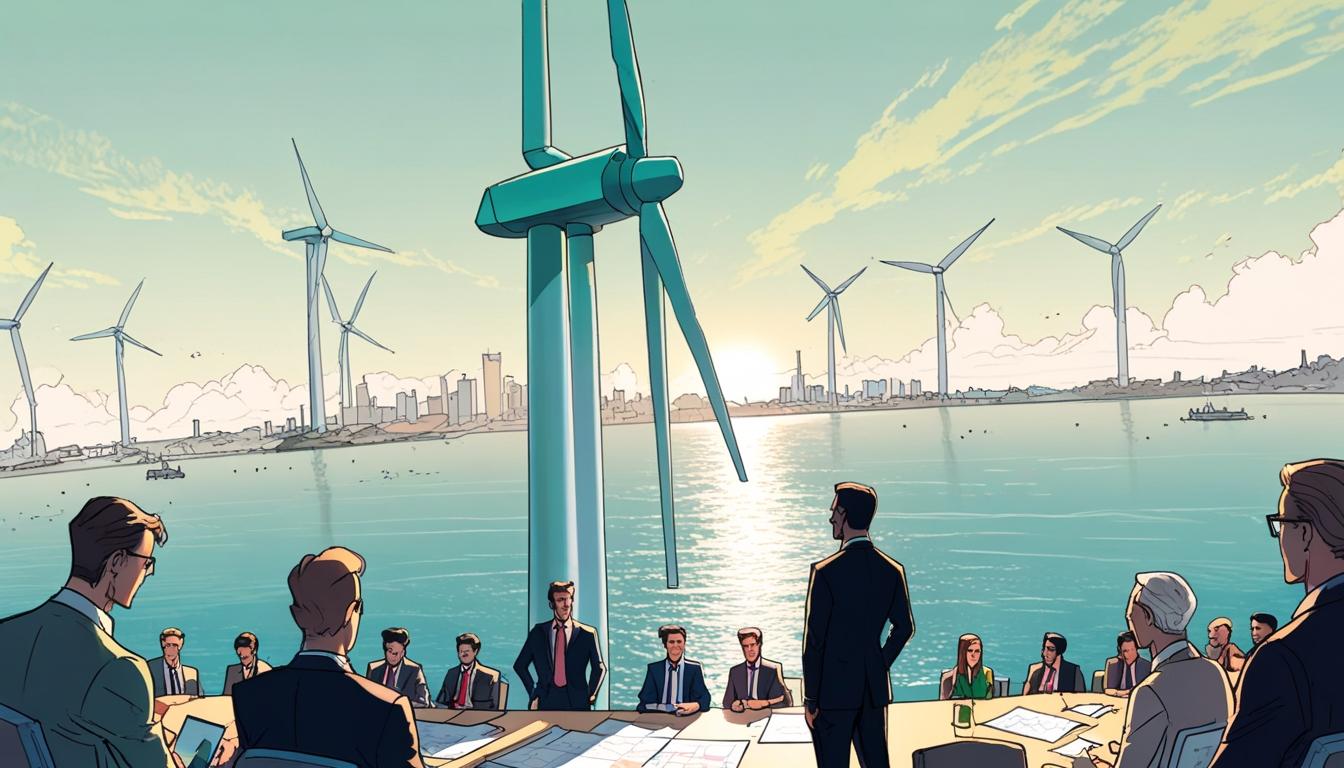The UK government is intensifying efforts to attract global investment in the green energy sector by offering financial incentives and infrastructure enhancements aimed at encouraging companies to establish manufacturing plants and supply chains within the country. This initiative is particularly focused on drawing investors who have been deterred by political uncertainties in the United States under former President Donald Trump’s administration.
A key component of this push includes an advance allocation of £300 million dedicated to offshore windfarm development, an area where the UK maintains a leading position internationally. This move is accompanied by a major summit in London, which brings together banks and prominent international companies from 60 countries. The summit, scheduled for Thursday and Friday at Lancaster House, is organised in partnership with the International Energy Agency.
Energy Secretary Ed Miliband has actively reached out to a broad spectrum of global investors, highlighting the UK’s industrial strategy and the nation’s commitment to achieving low-carbon electricity generation by 2030. A government insider stated, “We are looking at opportunities all over the world to attract clean energy investment and are setting up conversations with companies from all countries, to ensure the UK can be a winner in the global race for the clean industries of the future.”
The US, under President Joe Biden’s administration, attracted numerous international investors with its Inflation Reduction Act, which provides billions in incentives for low-carbon technology manufacturing. However, some companies have become cautious about investments in America due to former President Trump's scepticism towards wind and solar power and his promotion of fossil fuels. Just last week, the Trump administration ordered a halt to work on a windfarm project off the coast of New York, owned by Norway’s Equinor. “That kind of thing really worries investors,” remarked one industry insider. “Nobody knows what will happen next.”
Labour leader Keir Starmer is set to address the energy security summit and reaffirm the UK’s dedication to transitioning to a low-carbon economy despite criticism from the Conservative Party and Reform UK. Ahead of the event, Starmer declared, “Let my message to the world go out: come and build the clean energy future in Britain.”
Ajai Ahluwalia, head of supply chain at RenewableUK, emphasised the UK’s appeal, especially given the uncertainties caused by the fluctuating policies under Trump’s presidency. He noted that US companies have already shown interest in investing in the UK’s expanding clean energy sector, including port developments for offshore wind. “The global uncertainty currently being caused by President Trump’s ever-changing policies on tariffs, and his opposition to clean energy, mean that the UK has an even greater opportunity than before to provide a stable, attractive market for international investors in renewables,” Ahluwalia said.
Labour has pledged £8.3 billion over the current parliamentary term to support Great British Energy, a nationally owned enterprise that will co-invest in clean energy projects alongside the private sector. However, questions remain regarding this funding commitment as Chancellor Rachel Reeves is expected to apply spending cuts.
The summit will see participation from a senior US official, but China will not attend. Chinese President Xi Jinping took part in a recent United Nations online climate meeting, where he reaffirmed China’s dedication to clean energy despite "some major country’s pursuit of unilateralism and protectionism."
While the renewable energy industry has broadly welcomed the UK government’s measures, some wildlife campaigners have voiced concerns about a recent government amendment to the planning and infrastructure bill. This amendment would reduce consultation during the pre-application stage for nationally significant infrastructure projects, potentially impacting environmental assessments.
Matt Browne, head of public affairs at the Wildlife Trusts, described the proposed changes as a “misstep” that could harm the natural world. He warned that “removing the opportunity for experts to improve proposals at an early stage could lead to badly designed infrastructure which harms precious natural areas and destroy communities’ much-loved green spaces.”
Campaigners have also called for greater attention to the UK’s domestic energy needs, citing the importance of insulating poorly heated homes alongside renewable energy development. Mike Childs, head of science, policy, and research at Friends of the Earth, voiced concern over the nation’s vulnerability to fluctuating fossil fuel prices. “Our country has been held hostage by the yo-yo-ing price of dirty fossil fuels for far too long,” he said.
Labour’s clean energy agenda and its commitment to achieving net zero greenhouse gas emissions by 2050 will face opposition during the upcoming local elections. Parties such as Reform UK and the Conservatives are expected to attribute high prices and industrial challenges, such as those in steel production, to net zero policies. However, experts counter that these issues primarily stem from an overdependence on fossil fuels.
Rob Gross, a director at the UK Energy Research Centre, explained that electricity costs in the UK are projected to fall as the country reduces its reliance on gas-powered plants, which currently produce the most expensive electricity and influence market prices. “If you look across Europe, and you look at the electricity wholesale price, those with the lowest wholesale market prices are those which are least reliant on gas for generation. Those that have the highest prices are those most exposed to gas generation,” he said. “Our reliance on gas for electricity generation has been decreasing steadily as the share of renewables increases, but it will take several more years before we have severed the link to price formation.”
The Guardian is reporting these developments as part of the UK’s broader strategy to strengthen its position in the global green energy market amid shifting international dynamics and domestic political debates.
Source: Noah Wire Services
